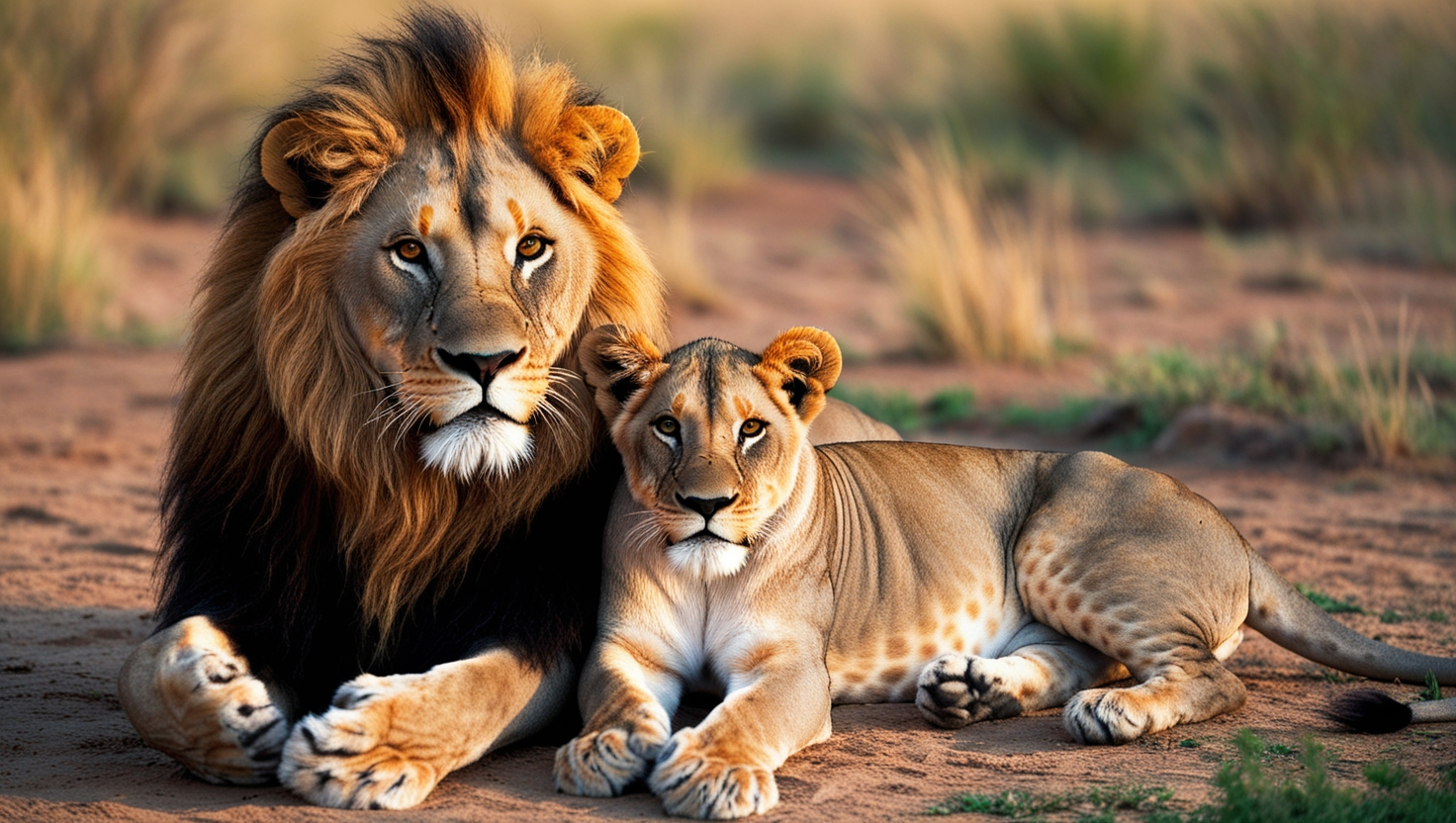Introduction
Lions, known as the kings of the animal kingdom, are fascinating creatures that inspire awe and curiosity. One of the most common questions people ask about lions is, “How long do lions live? Gender, and the challenges they face in their environment. In this article, we will explore the lifespan of lions, the factors that influence their longevity, and the differences between wild and captive lions.
The Average Lifespan of Lions in the Wild
Lions in the wild frequently survive for 10 to 14 years. So, how long do lions live in their natural habitat? This range can vary due to environmental factors and survival challenges. While lions are apex predators, they face numerous risks throughout their lives that can affect how long lions live. For instance, injuries from territorial fights, disease, and the availability of food can all impact their lifespan. Additionally, lions in the wild often struggle to protect themselves from poaching and human-wildlife conflict, further reducing their average life expectancy.
The Role of Gender in Lion Lifespan
One interesting aspect of how long lions live is the difference between male and female lions. Generally, male lions have a shorter lifespan than their female counterparts. While female lions may live up to 14 years in the wild, male lions often live only 8 to 12 years. This disparity is primarily due to the more hazardous lives of male lions, who frequently engage in territorial disputes with other males. These fights, which are essential for establishing dominance, can result in fatal injuries. Additionally, male lions are often kicked out of their pride once they reach a certain age, making survival even more difficult as they age.
On the other hand, female lions typically live longer because they stay within a pride where they are protected and do not face the same level of danger as males. The females share responsibilities for hunting and raising cubs, which often contribute to a more stable and secure existence. The social structure of pride helps female lions survive longer than the solitary lives that most male lions are forced to live once they are ousted from their birth pride.
The Impact of the Environment on Lion Lifespan
The environment in which lions live plays a significant role in determining how long lions live. Lions in the wild must contend with a variety of challenges, including extreme weather, food scarcity, and predation from other animals. Harsh environmental conditions, such as drought or a shortage of prey, can cause malnutrition and weaken lions, ultimately reducing their lifespan. Furthermore, lions must be constantly alert to the presence of other predators like hyenas and crocodiles, which can threaten their survival.
However, lions living in protected areas, such as wildlife reserves or national parks, have a better chance of survival due to the presence of abundant food sources and reduced human interference. In these controlled environments, lions are less likely to face poaching or competition from other predators. Therefore, their lifespan in these areas can extend beyond the typical 10 to 14 years.
How Long Do Lions Live in Captivity?
Lions living in captivity tend to have a longer lifespan compared to those in the wild. In controlled environments like zoos or animal sanctuaries, lions can live up to 20 years, and some even reach their early 20s. The reason for this extended lifespan is that lions in captivity are not exposed to the same risks they face in the wild. They receive regular medical care and and a consistent food supply and athey re protected from predators, all of which contribute to their longevity.
However, living in captivity also presents its own set of challenges. Lions in zoos and wildlife sanctuaries are confined to smaller spaces, which can affect their mental and physical well-being. Despite the better physical conditions, captivity can lead to stress and behavioral issues, which may shorten their lifespan if not properly managed.
Factors That Affect Lion Longevity
Several factors influence how long lions live in both the wild and captivity. Here are a few of the main Bullets:
- Diet and Nutrition: Lions in the wild may face periods of food scarcity, which can weaken them and reduce their lifespan. In contrast, lions in captivity are fed a consistent and balanced diet, contributing to their longer life expectancy.
- Medical Care: Lions in captivity have access to regular veterinary care, vaccinations, and treatments for injuries or illnesses. In the wild, however, lions must rely on their natural healing abilities, which may not always be enough to survive severe injuries or diseases.
- Predators and Competition: In the wild, lions must compete with other predators for food and resources, and they are vulnerable to attacks from hyenas, leopards, and other species. In captivity, they are shielded from these threats, leading to a longer, more secure life.
- Genetics: The genetic makeup of a lion also plays a significant role in determining how long lions live. Some lions may be genetically predisposed to live longer, while others may have a higher risk of certain diseases or health problems that shorten their lifespan.
- Social Structure: The pride structure plays a role in the survival of female lions. A well-established pride with strong bonds among members helps protect the lionesses and their cubs from external threats, increasing their chances of living longer.
The Challenges Faced by Lions in the Wild
Lions face numerous challenges that contribute to their relatively short lifespans in the wild. These challenges include:
- Territorial Disputes: Male lions, in particular, face the constant threat of injury or death during territorial fights with rival males. These disputes often arise when a new male takes over a pride, resulting in violent confrontations.
- Human-Wildlife Conflict: Lions living near human settlements are often at risk of being killed due to conflict with farmers and livestock owners. This human-wildlife conflict is one of the leading causes of lion mortality in the wild.
- Poaching: Lions are also targeted by poachers for their valuable body parts, such as their skin, bones, and teeth, which are sold on the black market.
- Disease: Lions in the wild can succumb to diseases like tuberculosis, canine distemper, and other infections, which can reduce their life expectancy.
The Importance of Conservation for Lion Lifespan
The conservation of lions is crucial for ensuring their long-term survival and improving their lifespan. Efforts to protect lions from poaching, habitat loss, and human-wildlife conflict can help increase their numbers and ensure that they live longer healthier lives. Many wildlife organizations are working to establish protected reserves and improve public awareness about the importance of preserving these majestic animals.
Conclusion
So, how long do lions live? The answer depends on a variety of factors, including whether they live in the wild or captivity. In the wild, lions typically live for 10 to 14 years, though males tend to have shorter lifespans due to the risks associated with territorial disputes. In captivity, where medical care and food are readily available, lions can live up to 20 years. The lifespan of a lion is influenced by factors such as diet, medical care, social structure, and environmental challenges. By understanding these factors, we can better appreciate the challenges lions face and work to ensure that these magnificent creatures continue to thrive in the wild for generations to come. So, the next time someone asks how long do lions live, you’ll have a more informed answer to share.







